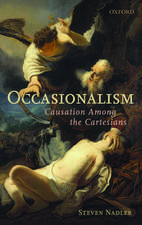Heidegger on Ontotheology: Technology and the Politics of Education
Autor Iain Thomsonen Limba Engleză Paperback – 10 iul 2005
| Toate formatele și edițiile | Preț | Express |
|---|---|---|
| Paperback (1) | 201.17 lei 6-8 săpt. | |
| Cambridge University Press – 10 iul 2005 | 201.17 lei 6-8 săpt. | |
| Hardback (1) | 433.10 lei 6-8 săpt. | |
| Cambridge University Press – 10 iul 2005 | 433.10 lei 6-8 săpt. |
Preț: 201.17 lei
Nou
Puncte Express: 302
Preț estimativ în valută:
38.50€ • 40.04$ • 31.78£
38.50€ • 40.04$ • 31.78£
Carte tipărită la comandă
Livrare economică 14-28 aprilie
Preluare comenzi: 021 569.72.76
Specificații
ISBN-13: 9780521616591
ISBN-10: 052161659X
Pagini: 224
Dimensiuni: 152 x 229 x 13 mm
Greutate: 0.31 kg
Ediția:New.
Editura: Cambridge University Press
Colecția Cambridge University Press
Locul publicării:New York, United States
ISBN-10: 052161659X
Pagini: 224
Dimensiuni: 152 x 229 x 13 mm
Greutate: 0.31 kg
Ediția:New.
Editura: Cambridge University Press
Colecția Cambridge University Press
Locul publicării:New York, United States
Cuprins
1. Ontotheology? understanding Heidegger's deconstruction of metaphysics; 2. Understanding ontotheology as the basis for Heidegger's critique of technology; 3. Heidegger and the politics of the university; 4. Heidegger's mature vision of ontological education or: how we become what we are.
Recenzii
"By far the deepest and the most illuminating account of the relation between Heidegger's philosophy and his politics yet offered. Thomson shows convincingly how Heidegger's political engagement followed from his understanding of the role of philosophy in the university and how what was most original and important in his later thinking emerged as a result of this tragic involvement."
-Hubert Dreyfus, University of California, Berkeley
"Heidegger on Ontotheology is a must-read for anyone who is seriously interested in Heidegger or the development of German philosophy during the 20th century. It is a trail-blazing study, bringing to the interpretation of Heidegger's later philosophy the clarity and rigor that have until now been restricted to works on Heidegger's early period. The central thesis of the book is that Heidegger's metaphilosophy, his critique of technology, and the catastrophe of his involvement in Nazism are all interconnected. Thomson is the first author to establish a thoughtful, credible, and direct connection between Heidegger's philosophy of the 1920s and his involvement in Nazism. Thomson answers a challenge posed to readers of Heidegger: to acknowledge this connection, while at the same time salvaging what remains important and even urgent in Heidegger's critiques of the culture of technology and modern university education."
-Bill Blattner, Georgetown University
"This is compelling material that reads in part like a detective story and in part like a confessional biography; it is rare stuff, indeed, in philosophy and yet tragically and inescapably a crucial part of history of late-modern Western philosophy (as it is to date the most tragic and ultimately nihilistic espisode in European culture). ...In short, this book is to be highly recommended. It is refreshingly free of jargon; it shines brightly in its intelligence and lays out the issues expertly. It deserves the widest readership and critical discussion, andit is to be hoped that this review might so inspire education scholars."
-Michael Peters, Columbia University Teachers College Record
"This impressive study argues that Heidegger's deconstruction of metaphysics as ontotheology, when suitably understood , provides the key to his misunderstood critique of technology and to the underappreciated potential of his thought to contribute to efforts to respond to 'our own growing crisis in higher education.' The author is well versed in Heidegger's thought and the extensive secondary literature on it and he puts this expertise to superb use in a text that is lucidly written with intelligence, verve, and conviction."
-Daniel Dahlstrom, Notre Dame Philosophical Review
"This book is substantial achievement, exhibiting both scholarly erudition and philosophical sensitivity at virtually every turn. ...Thomson's work stands as a significant accomplishment. He has succeeded in creating a lively and engrossing portrait of Heidegger's thought. This book indeed sets a hight standard by which future studies of Heidegger will have to be judged."
-Benjamin Crowe, Philosophy in Review
"The book is generally well written and...intelligible almost throughout...The treatments of Kant and Nietzche are instructive and add to the read usefulness of the book. For those interested in its primary aim, and we ought to be, it is a work of real value."
-Department of Classics, Dalhousie University and King's College, Canada, Ancient Philosophy
-Hubert Dreyfus, University of California, Berkeley
"Heidegger on Ontotheology is a must-read for anyone who is seriously interested in Heidegger or the development of German philosophy during the 20th century. It is a trail-blazing study, bringing to the interpretation of Heidegger's later philosophy the clarity and rigor that have until now been restricted to works on Heidegger's early period. The central thesis of the book is that Heidegger's metaphilosophy, his critique of technology, and the catastrophe of his involvement in Nazism are all interconnected. Thomson is the first author to establish a thoughtful, credible, and direct connection between Heidegger's philosophy of the 1920s and his involvement in Nazism. Thomson answers a challenge posed to readers of Heidegger: to acknowledge this connection, while at the same time salvaging what remains important and even urgent in Heidegger's critiques of the culture of technology and modern university education."
-Bill Blattner, Georgetown University
"This is compelling material that reads in part like a detective story and in part like a confessional biography; it is rare stuff, indeed, in philosophy and yet tragically and inescapably a crucial part of history of late-modern Western philosophy (as it is to date the most tragic and ultimately nihilistic espisode in European culture). ...In short, this book is to be highly recommended. It is refreshingly free of jargon; it shines brightly in its intelligence and lays out the issues expertly. It deserves the widest readership and critical discussion, andit is to be hoped that this review might so inspire education scholars."
-Michael Peters, Columbia University Teachers College Record
"This impressive study argues that Heidegger's deconstruction of metaphysics as ontotheology, when suitably understood , provides the key to his misunderstood critique of technology and to the underappreciated potential of his thought to contribute to efforts to respond to 'our own growing crisis in higher education.' The author is well versed in Heidegger's thought and the extensive secondary literature on it and he puts this expertise to superb use in a text that is lucidly written with intelligence, verve, and conviction."
-Daniel Dahlstrom, Notre Dame Philosophical Review
"This book is substantial achievement, exhibiting both scholarly erudition and philosophical sensitivity at virtually every turn. ...Thomson's work stands as a significant accomplishment. He has succeeded in creating a lively and engrossing portrait of Heidegger's thought. This book indeed sets a hight standard by which future studies of Heidegger will have to be judged."
-Benjamin Crowe, Philosophy in Review
"The book is generally well written and...intelligible almost throughout...The treatments of Kant and Nietzche are instructive and add to the read usefulness of the book. For those interested in its primary aim, and we ought to be, it is a work of real value."
-Department of Classics, Dalhousie University and King's College, Canada, Ancient Philosophy
Descriere
This book discusses much of Heidegger's later thought on metaphysics as 'ontotheology', education, and National Socialism.

















